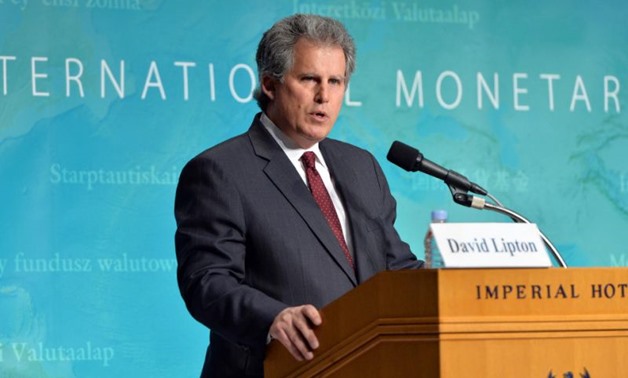
The International Monetary Fund's Acting Managing Director David Lipton - Reuters
CAIRO – 25 July 2019: Egypt has successfully completed the three-year arrangement under the Extended Fund Facility and achieved its main objectives, Acting Managing Director and Chairman of International Monetary Fund’s (IMF) board David Lipton said after approving the final tranche of Egypt’s loan.
Lipton stated that the macroeconomic situation has improved markedly since 2016, supported by the authorities’ strong ownership of their reform program and decisive upfront policy actions, adding that critical macroeconomic reforms have been successful in correcting large external and domestic imbalances, achieving macroeconomic stabilization and a recovery in growth and employment, and putting public debt on a clearly declining trajectory.
“Monetary policy remains anchored by the medium-term objective of bringing inflation to single digits. Core inflation appears to be well contained, but the central bank should remain cautious until disinflation is firmly entrenched. Exchange rate flexibility remains essential to improve resilience to shocks and preserve competitiveness,” he added.
Commenting on achieving 2 percent primary surplus in 2018/2019, he said that it helped anchor a further decline in the public-debt-to-GDP ratio.
“It will be important to maintain primary surpluses at this level over the medium term to keep public debt on a downward trajectory. The elimination of most fuel subsidies, which are regressive, will encourage energy efficiency, help protect the budget from unexpected changes in oil prices, and free up fiscal space for social spending. Improved revenue mobilization is also essential to create room for spending in health, education, and social protection,” Lipton clarified.
As per Egypt’s outlook, he stated that the outlook remains favorable and provides an opportune juncture to further advance structural reforms to support more inclusive private sector led growth and job creation.
“The authorities have launched important reforms of competition policy, public procurement, industrial land allocation, and state-owned enterprises, and sustained implementation will be essential to ensure that statutory changes achieve meaningful results in the business climate. Deepening and broadening of effective reforms is critical to underpin the positive outlook for growth and unemployment,” he noted.
IMF’s executive council approved on Wednesday, July 24, the fifth and final tranche of Egypt’s Economic Reform Program.
The approval of the last review will allow Egypt to receive its last $2 billion disbursement of the $12 billion loan extended over three years.
Governor of the Central Bank of Egypt (CBE) Tarek Amer told Bloomberg that Egypt would receive the final tranche this week.
In November 2016, the Executive Board of the IMF approved a $12 billion loan as a financial assistance to Egypt to support the Egyptian economic reform program.
Upon the board's approval in November, Egypt embarked on a bold economic reform program that included floating its currency, losing around 50 percent of its value, as part of the economic reform program which imposed taxes, including the value-added tax (VAT), and cut energy subsidies, all with the aim of trimming the budget deficit.

Comments
Leave a Comment